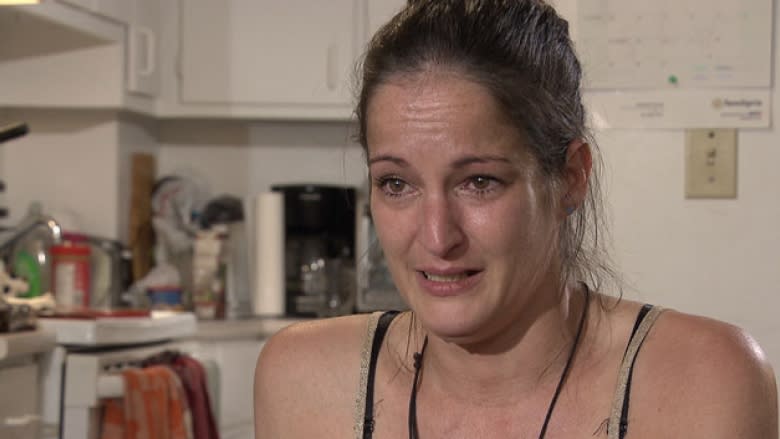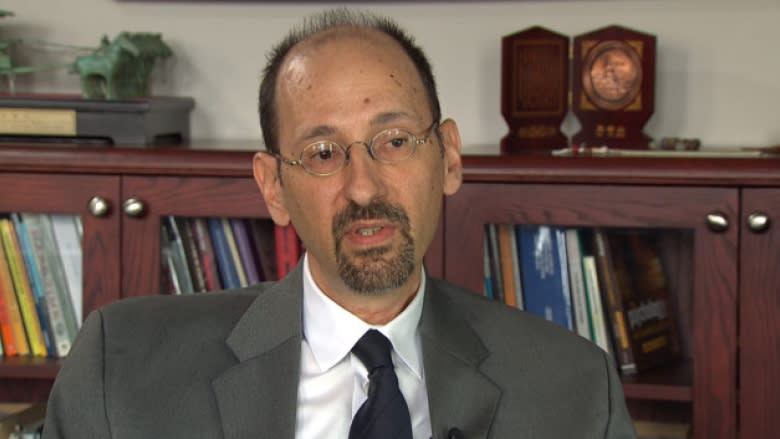Federal inmate dies by suicide after 118 days in solitary confinement
The day before Guy Langlois took his own life, he picked up the phone.
"Strangely, he got in touch with a lot of people to tell them he loved them and to never forget he loved them," his sister Nathalie Langlois recounts.
The next afternoon, the 38-year-old Métis inmate — who had a long history of mental health issues and suicide attempts — hanged himself in his cell, putting an end to a 118-day stretch in solitary confinement.
Langlois had been held in what the Correctional Service of Canada (CSC) calls "administrative segregation" since he arrived at the Atlantic Institution in Renous, N.B., at the end of December 2016.
Nathalie Langlois said her brother requested the placement because he feared for his life.
Dabbing at a constant stream of tears and apologizing for her puffy eyes, she told CBC News her brother had a long history of feeling anxious, paranoid and hyperactive. Many of those symptoms grew worse after he was badly beaten in a Montreal-area prison, left in a coma for days.
Before his death, Guy Langlois spent 18 years in prison for second-degree murder, convicted of killing a man on the streets of Montreal in 1998. He was 20 at the time, and his sister said she and her family never stopped telling him he'd one day be back home.
"We'll never give up on you. They can't keep you for your whole life. It's impossible. You've paid your debt," she said she told him on a recent phone call.
The Atlantic Institution was Guy's ninth prison. He had bounced between medium- and maximum-security prisons across Quebec until he was transferred to Renous, N.B., his family said.
He was due to be moved yet again on the day he died, Nathalie Langlois said, this time to a prison across the country, far from his family and where it was unlikely he'd be able to speak French.
"He didn't want to go. He refused the transfer to British Columbia, saying it would break his family and put his marriage in jeopardy. That his family didn't have the means to support him out there," she said.
Guy was declared dead at around 3:30 p.m. on April 24. The family wasn't notified until 11 p.m. the following night, when Nathalie said police showed up at her mother's home. Even at that point, she said Montreal Police couldn't tell the family much.
The CSC says it has since been in contact with the family to express its condolences and to explain it has convened an internal Board of Investigation (BOI) into the suicide, as is required.
Yet things didn't get any easier for the Langlois family when Guy's remains arrived in Montreal.
"We got a call at nine at night from his wife, saying the body was stuck at the airport. That we had to come up with $800 cash to get his body out of the airport. And you have to understand, there was no refrigeration," said Nathalie Langlois.
She said she managed to scrounge up $400 from her stepfather, and the funeral parlour covered the rest.
"We still don't have his ashes," said Langlois, explaining the funeral parlour won't release Guy's remains until the family has paid their bill in full.
Nathalie Langlois said she has asked Social Assistance to help cover the cost of her brother's funeral, but the province of Quebec has refused, as Guy was living in New Brunswick at the time of his death.
Her mother has since told her that CSC has committed to paying for the funeral.
Familiar story
Many aspects of Guy's story are familiar to Ivan Zinger, Canada's corrections watchdog. Last year, the Office of the Correctional Investigator released a report criticizing how CSC treats people whose loved ones have died behind bars.
"The family should have been contacted — that is the normal process — by a designated person, a well-trained person. ... It could be, for example, a chaplain," Zinger told CBC News, speaking from his office in downtown Ottawa.
CSC is also responsible for transporting an inmate's remains from the institution to a funeral home closest to the offender's family, he said.
A CSC spokesperson said it's restricted from saying much about Guy's case, but said it works with "third-party organizations for the cremation and delivery of an inmate's remains."
But Zinger says his concerns go beyond how the family was treated.
"Here we have, again, a case of somebody who has a long-documented history of psychological distress and mental health issues staying in segregation for almost four months, and hanging himself in segregation on the day that he was to be transferred across the country — far, far away from his family and his community and his support network."
No one with significant mental health issues should be in a prison, Zinger said, suggesting they should instead be in a hospital.
"On top of that, the individual was Aboriginal, and we know that Aboriginals are overrepresented ... in administrative segregation," he said, adding he is in the process of drafting a letter to CSC Commissioner Don Head outlining his concerns.
As for the transfer to B.C., Zinger said the rule of thumb is to keep inmates close to their family and home community in order to maximize opportunities to reintegrate offenders back into society.
In that regard, Nathalie said she feels CSC failed her brother.
"They didn't help; they didn't help him become a citizen like the rest of us," she said.
In addition to CSC's internal investigation, the provincial coroner is also investigating Langlois's death. Both processes are expected to take months.
The use of solitary confinement has been under fierce criticism since the 2007 death of teen inmate Ashley Smith, who choked herself to death while in a segregated prison cell.
When Prime Minister Justin Trudeau was first elected, he tasked his justice minister with implementing recommendations from the high-profile inquest into Smith's death, including tighter restrictions on the use of solitary confinement and better treatment for mentally ill inmates.
The UN says more than 15 consecutive days of solitary confinement amounts to a form of torture.



